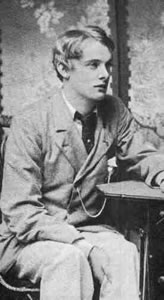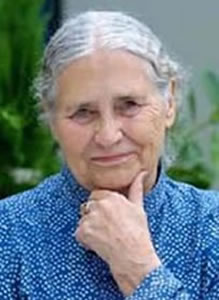Alfred Douglas werd geboren in Ham Hill in Worcestershire op 22 oktober 1870 en werd opgeleid aan Magdalen College in Oxford. Hij ontmoette Oscar Wilde in 1891, en begon al snel een relatie met hem. Toen zijn vader, John Sholto Douglas, 9de Markies van Queensberry, dit ontdekte, beledigde hij Oscar Wilde publiekelijk door een brief (met spelfout) achter te laten in Wilde’s club, geaddresseerd aan “Mr. Wilde posing as a Somdomite”. Wilde ging naar de rechtbank, en beschuldigde Queensberry van smaad. Het escaleerde, en sommigen geloven dat Lord Alfred hem aanmoedigde tegen zijn vader in te gaan. Wilde werd uiteindelijk beschuldigd van “onfatsoenlijkheid”, het eufemisme voor enige homoseksuele daad, publiekelijk of privé. Hij werd veroordeeld tot twee jaar gevangenisstraf. Nadat hij vrijkwam woonden Wilde en Douglas samen in Napels voor een periode van drie maanden. Daarna woonden ze een tijd apart in Parijs. In 1902 trouwde Douglas Olive Eleanor Custance, een erfgename en dichter. Zij kregen een zoon, Raymond. Douglas publiceerde een aantal dichtbundels, waarvan sommige goed werden ontvangen. Ook schreef hij twee boeken over zijn relatie met Wilde.
The Dead Poet
I dreamed of him last night, I saw his face
All radiant and unshadowed of distress,
And as of old, in music measureless,
I heard his golden voice and marked him trace
Under the common thing the hidden grace,
And conjure wonder out of emptiness,
Till mean things put on beauty like a dress
And all the world was an enchanted place.
And then methought outside a fast locked gate
I mourned the loss of unrecorded words,
Forgotten tales and mysteries half said,
Wonders that might have been articulate,
And voiceless thoughts like murdered singing birds.
And so I woke and knew that he was dead.
The City of the Soul: II
What shall we do, my soul, to please the King?
Seeing he hath no pleasure in the dance,
And hath condemned the honeyed utterance
Of silver flutes and mouths made round to sing.
Along the wall red roses climb and cling,
And oh! my prince, lift up thy countenance,
For there be thoughts like roses that entrance
More than the languors of soft lute-playing.
Think how the hidden things that poets see
In amber eves or mornings crystalline,
Hide in the soul their constant quenchless light,
Till, called by some celestial alchemy,
Out of forgotten depths, they rise and shine
Like buried treasure on Midsummer night.

Alfred Douglas (22 oktober 1870 – 20 maart 1945)
De Britse schrijster Doris Lessing werd geboren als Doris May Tailor in Kermanshah, Perzië op 22 oktober 1919. Lessing woonde van 1924 tot 1949 in Rhodesië (thans Zimbabwe), waar zij een hard leven leidde op het land. Het reusachtige stuk grond dat zij er gekocht hadden bracht niet de verwachte rijkdom, zodat haar moeder de droom van een Victoriaans bestaan “onder de wilden” moest opgeven. De schrijfster had een moeilijke en ongelukkige jeugd en haar teksten over het leven in de Britse kolonies van Afrika zijn vol mededogen met het lege bestaan van de Britste kolonisten, als ook met de troosteloze situatie van de inheemse bevolking. Haar eerste roman, The Grass is Singing, verscheen na haar terugkeer naar Engeland in 1949.
Uit: Ben, In the World (verschenen in 2000)
‘How old are you?’
‘Eighteen.’
This reply did not come at once because Ben was afraid of what he knew was going to happen now, which was that the young man behind the glass protecting him from the public set down his biro on the form he was filling in, and then, with a look on his face that Ben knew only too well, inspected his client. He was allowing himself amusement that was impatient, but it was not quite derision. He was seeing a short, stout, or at least heavily built man — he was wearing a jacket too big for him — who must be at least forty. And that face! It was a broad face, with strongly delineated features, a mouth stretched in a grin — what did he think was so bloody funny? — a broad nose with flaring nostrils, eyes that were greenish, with sandy lashes, under bristly sandy brows. He had a short neat pointed beard that didn’t fit with the face. His hair was yellow and seemed — like his grin — to shock and annoy, long, and falling forward in a slope, and in stifflocks on either side, as if trying to caricature a fashionable cut. To cap it all, he was using a posh voice; was he taking the mickey? The clerk wa
s going in for this minute inspection because he was discommoded by Ben to the point of feeling angry. He sounded peevish when he said, ‘You can’t be eighteen. Come on, what’s your real age?’
Ben was silent. He was on the alert, every little bit of him, knowing there was danger. He wished he had not come to this place, which could close its walls around him. He was listening to the noises from outside, for reassurance from his normality. Some pigeons were conversing in a plane tree on the pavement, and he was with them, thinking how they sat gripping twigs with pink claws that he could feel tightening around his own finger; they were contented, with the sun on their backs. Inside here, were sounds that he could not understand until he had isolated each one. Meanwhile the young man in front of him was waiting, his hand holding the biro and fiddling it between his fingers. A telephone rang just beside him. On either side of him were several young men and women with that glass in front of them. Some used instruments that clicked and chattered, some stared at screens where words appeared and went. Each of these noisy machines Ben knew was probably hostile to him. Now he moved slightly to one side, to get rid of the reflections on the glass that were bothering him, and preventing him from properly seeing this person who was angry with him.”

Doris Lessing (Kermanshah, 22 oktober 1919)
